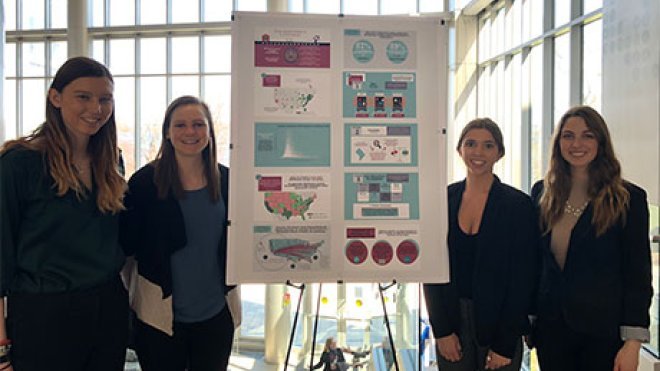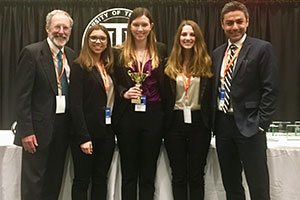Analytics Team Claims Second Place in National Analytics Challenge
Business students take home national award in Association for Information Systems national analytics challenge

DALLAS, TEXAS – If the executives of QVC want to improve customer experience and increase repeat sales, they should consult with the Roger Williams University Analytics Club, who just took home a second-place victory crunching the online-shopping network’s product data in the Association for Information Systems’ (AIS) national collegiate analytics competition.
The team of four – Samantha Bilinsky, Makayla D’Urso, Carolan Kelley and Brittany Watson – put their business skills and knowledge to the test at the AIS NBCUniversal Analytics Challenge held in Dallas, Texas, in April. Their win builds upon last year’s strong showing from RWU Analytics Club teams, which claimed first and third places in the previous national analytics challenge.
“Our student members not only practice critical thinking and learn data analysis techniques, but also gain a great deal of experience in teamwork and communication skills,” said Assistant Professor of Business Management Farbod Farhadi, who helped guide Analytics Club along with Professor Mark Brickley. “This year, there were incredible teams from all around the U.S., and they all had amazing outputs. It was certainly a great competition to be part of and is setting the bar higher every year.”
Their challenge was to determine whether QVC’s delivery speed affects repeat business. To answer that, Watson, a junior marketing major, said the team addressed three questions – is the distribution method effective, does product positioning in distribution centers matter, and does delivery speed affect customer loyalty?
Working with real data from QVC’s distribution network across the country, the team used GIS (geographic information systems) mapping software and plugged the numbers into spreadsheets and data-visualization software to see where products have to stop before arriving at customers’ doorsteps. They then looked at how close and effective that distribution center is, and whether delivery speed appears to impact customers’ decisions in ordering more.
In order to work with the best information, Kelley, a junior double-major in marketing and web development, emphasized that the team took into account “normalizing” product sales among states. Meaning that they scaled sale volume by state population to derive customer interest – a more predictable measure of repeat sales, she said, and one that the NBCUniversal Analytics Challenge judges were focusing on.
“We had decided to do sales normalized by state population,” even though it wasn’t specifically outlined in the challenge details, Kelley said. “And our team went after other groups who got asked about that by the judges and they didn’t have an answer. I was like, we did that!

Watson said that what they came up with was analysis showing that the company could do better at routing packages through closer distribution centers to customers’ addresses in order to get the product to its destination more quickly and effectively, making their customers happier and come back for more business. They presented their conclusions to a panel of judges, each teammate taking a turn to address the competition questions and make recommendations on addressing the issues through a well-designed graphic visualization.
“One of the things that helped us succeed was how we went about telling our story,” Watson said. “We made sure it was very straightforward, we made sure we addressed the questions and made it easy to follow. Our infographic addressed everything in a comprehensible, understandable way that anyone could follow.”
In addition to gaining professional-level presentation experience, they said they learned to work as a team, build strong communication skills and seek networking opportunities among their peers from across the country.
“It’s definitely worth doing this competition,” said Bilinsky, a junior double major in accounting and finance who was also part of one of the winning teams in last year’s national analytics challenge. “You get to have this great experience of going to different conferences, see what everyone else is doing and bring new ideas back here, whether it’s for competitions or new ideas for the club. And it looks great on a résumé. Analytics is becoming more popular in the accounting world, and since I’ve already been doing that I can talk to employers I’m interviewing with about what I’ve done with the club. It’ll give me an edge over other people.”
At RWU, we develop Civic Scholars who believe in community-engaged work. That’s why we commit to providing every student an opportunity that empowers them to put their knowledge and skills to the test solving real-world problems and creating meaningful change with community partners. Learn more about the Civic Scholars program and how to help us reach our goal of every student participating in civic scholarship.